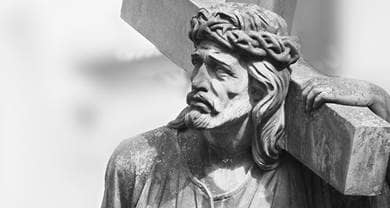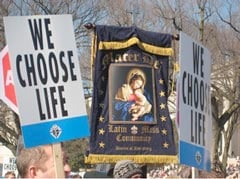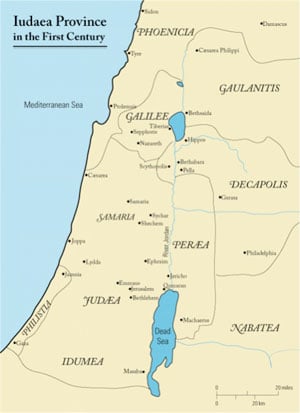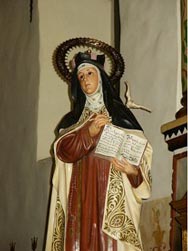- Trending:
- Forgiveness
- |
- Resurrection
- |
- Joy
- |
- Afterlife

RELIGION LIBRARY
Christianity
Gender and Sexuality
 Early Christian debates regarding sexuality, marriage, and the role of women have continued to the present. Christians have responded in a variety of ways to secular divorce laws, birth control, legalized abortion, and homosexuality. The diversity of response is usually categorized as either "liberal" and "conservative" and these divisions cut across denominations. The conservative view holds that certain scriptural texts and the tradition of the Church teach that premarital sex, abortion, and homosexual behavior are always wrong. The liberal view makes no rigid generalization of right or wrong in these matters but regards the presence or absence of caring love to be the decisive factor in determining the rightness or wrongness of a particular situation.
Early Christian debates regarding sexuality, marriage, and the role of women have continued to the present. Christians have responded in a variety of ways to secular divorce laws, birth control, legalized abortion, and homosexuality. The diversity of response is usually categorized as either "liberal" and "conservative" and these divisions cut across denominations. The conservative view holds that certain scriptural texts and the tradition of the Church teach that premarital sex, abortion, and homosexual behavior are always wrong. The liberal view makes no rigid generalization of right or wrong in these matters but regards the presence or absence of caring love to be the decisive factor in determining the rightness or wrongness of a particular situation.
 Christians recognize that Jesus' ministry was marked by an extraordinary respect for and inclusion of women, yet many Church leaders have relegated them to second-class status. Traditional Christian teaching on the role of women was strongly influenced by the Jewish culture of Palestine in the 1st century C.E. The first letter to Timothy defines the role of women using an interpretation of the story of the creation and fall found in the Book of Genesis:
Christians recognize that Jesus' ministry was marked by an extraordinary respect for and inclusion of women, yet many Church leaders have relegated them to second-class status. Traditional Christian teaching on the role of women was strongly influenced by the Jewish culture of Palestine in the 1st century C.E. The first letter to Timothy defines the role of women using an interpretation of the story of the creation and fall found in the Book of Genesis:
A woman should learn in quietness and full submission. I do not permit a woman to teach or to have authority over a man; she must be silent. For Adam was formed first, then Eve. And Adam was not the one deceived; it was the woman who was deceived and became a sinner (1 Timothy 2:11-14).
One interpretation of this passage is that man, created first by God, should have dominion over women. Being the first to sin, women cannot teach men and must remain silent in church. Women were therefore restricted from participating fully in ordained ministry. These arguments still characterize the views of many Christians today.
Some churches have declared marriage, viewed as a gift from God, to be a sacrament. Within the boundaries of a monogamous marriage between a man and a woman, sex is God's sanctioned means of procreation, as well as a positive source of love and companionship. Nearly all the Church Fathers regarded women's bodies as a threat to the salvation of men, who were thought to be victimized by the power of sexual desire.  Women were often described using such vile terms as "root of all evil" (Jerome c. 342-420), or "the devil's gateway" (Tertullian c. 160-225). Convinced that the return of Jesus and the Final Judgment were imminent, some early Christians focused on keeping their souls pure in anticipation. Virginity and celibacy were renunciations of the baser instincts of sexual desire and were prized as holier states than a married life.
Women were often described using such vile terms as "root of all evil" (Jerome c. 342-420), or "the devil's gateway" (Tertullian c. 160-225). Convinced that the return of Jesus and the Final Judgment were imminent, some early Christians focused on keeping their souls pure in anticipation. Virginity and celibacy were renunciations of the baser instincts of sexual desire and were prized as holier states than a married life.
Both men and women were allowed to choose a monastic life of celibacy, but women were still under the rule of men, whether the local bishop, the patriarch, or the pope. During the Middle Ages, women in Christian communities had few rights and did not receive a formal education.  Many women fought their oppression, but they risked being denounced or burned as witches. Nonetheless, women such as Hildegard of Bingen (1098-1179), Catherine of Siena (1347-1380), and Teresa of Avila (1515-1582) earned a positive reputation for wisdom, mystical experience, piety, and charity to the poor and the suffering.
Many women fought their oppression, but they risked being denounced or burned as witches. Nonetheless, women such as Hildegard of Bingen (1098-1179), Catherine of Siena (1347-1380), and Teresa of Avila (1515-1582) earned a positive reputation for wisdom, mystical experience, piety, and charity to the poor and the suffering.
In both Christian churches and Christian societies, the reassessment of women's roles is a very recent development. Contemporary biblical scholars and theologians, both women and men, both liberal and conservative, have read the scriptures with a fresh eye, focusing on scripture passages that affirm a new vision of women as the equals of men. In Genesis, they read that women were created in God's image: "male and female God created them" (Genesis 1:27). In the Gospels, they find evidence that Jesus had profound trust in the capabilities of women (e.g., Luke 7:37-50). They consider Paul's strong arguments for equality to be decisive: "There is neither Jew nor Greek, there is neither slave nor freeperson, there is neither male nor female; for all of you are one in Christ Jesus" (Galatians 3:28). And they note that the Acts of the Apostles contain stories of women who were early Church leaders.
 The activities of strong, capable women have broken many barriers to the full participation of women in the life of the Church, and women now serve as influential leaders, ministers, theologians, and even bishops in some communities. Theologians explore women's history and experience to discover fresh resources for meeting the challenges of the contemporary world. In liturgy, sermons, and doctrines, Church leaders emphasize the nurturing, sustaining, and parenting aspects of God, qualities traditionally viewed as feminine. Paradigms of mutual responsibility and relationship in community are replacing the old paradigms of hierarchy and authority. In some church bodies, ideas of equality for women and leadership by women still stir up controversy. In other churches, these ideas spark fresh gospel interpretations.
The activities of strong, capable women have broken many barriers to the full participation of women in the life of the Church, and women now serve as influential leaders, ministers, theologians, and even bishops in some communities. Theologians explore women's history and experience to discover fresh resources for meeting the challenges of the contemporary world. In liturgy, sermons, and doctrines, Church leaders emphasize the nurturing, sustaining, and parenting aspects of God, qualities traditionally viewed as feminine. Paradigms of mutual responsibility and relationship in community are replacing the old paradigms of hierarchy and authority. In some church bodies, ideas of equality for women and leadership by women still stir up controversy. In other churches, these ideas spark fresh gospel interpretations.
Less debated in most of Christian history has been the status of homosexuality. Today, however, a growing acceptance, or at least tolerance, of homosexuality in secular society has fostered debate among Christians regarding the role of homosexuals within the congregation. Some churches have recently suffered the painful separation of schism over the ordination of gay men and women.
 The changing nature of Christian acceptance of gay people into the sacraments of marriage and ordination has evoked comparisons with the early and ongoing struggles of women. While many Christians turn to the Bible for support of their view that God has condemned homosexual acts, many scholars and theologians read the
The changing nature of Christian acceptance of gay people into the sacraments of marriage and ordination has evoked comparisons with the early and ongoing struggles of women. While many Christians turn to the Bible for support of their view that God has condemned homosexual acts, many scholars and theologians read the  Bible with fresh eyes, discovering new ways of understanding what the Bible says about sexuality. Some denominations have adopted the official view that there is nothing inherently sinful about homosexuality, and the Episcopal Church of the United States of America has ordained an openly gay bishop.
Bible with fresh eyes, discovering new ways of understanding what the Bible says about sexuality. Some denominations have adopted the official view that there is nothing inherently sinful about homosexuality, and the Episcopal Church of the United States of America has ordained an openly gay bishop.  Biblical scholars such as Phyllis Trible and theologians such as Mona West have developed fresh ways of understanding sexuality and relationship in the context of Christian teaching. The contributions of gay and lesbian Christians continue to contribute to a fuller understanding of God and the gospel's message.
Biblical scholars such as Phyllis Trible and theologians such as Mona West have developed fresh ways of understanding sexuality and relationship in the context of Christian teaching. The contributions of gay and lesbian Christians continue to contribute to a fuller understanding of God and the gospel's message.
Study Questions:
1. Are “liberal” and “conservative” Christians categorized this way because of their political views? Explain.
2. Why is there no consensus about the role of women within the Church?
3. Who practices celibacy within Christianity? Why?
4. Is homosexual practice acceptable welcome within the Christian tradition? Are homosexual leaders accepted? Explain.










